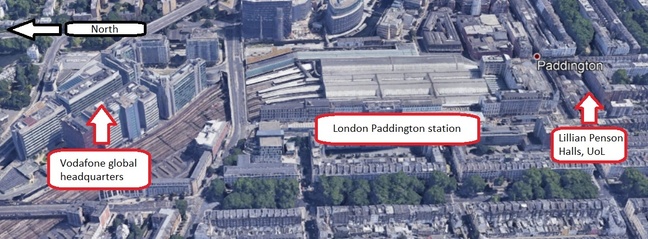This article is more than 1 year old
Uni of London loses attempt to block mobe mast surveyors from Paddington rooftop
But it will earn £50 from it, so that's nice
The University of London has lost a Court of Appeal attempt to block a new mobile phone mast that would have served Vodafone's London HQ.
Cornerstone Telecommunications, which is jointly owned by Vodafone and Telefónica (parent firm of O2 UK), saw off the university's attempt to overthrow an earlier judgment giving them the right to inspect a student halls' roof with a view to putting a new mast on it.
When Cornerstone asked the university in 2018 if it could poke around the roof of Lillian Penson Hall, across the road from Paddington Station, the academic institution refused – and pointed to a relatively new piece of law, the Electronic Communications Code, which it said didn't give Cornerstone the right to freely poke around in the hope of finding somewhere suitable to plant a mast.
In the original Upper Tribunal judgment of October 2018, Martin Rodger QC found that Cornerstone had told the university its demands for access were "non-negotiable", something he described as "a poor move in what should be a consensual process".
He also found that Cornerstone offered to pay the university all of £50 for that access.
The Electronic Communications Code gives mast firms the right to access land for maintaining phone masts and associated infrastructure, and more or less says that the landowner has very limited grounds to block this from happening. As the Court of Appeal has just ruled, it now gives mast firms the legal right to survey land before installing any equipment.
Lawyers for the university tried convincing Master of the Rolls Sir Terence Etherton and Lord Justices Lewison and Arnold that when it passed the code, Parliament hadn't intended to let mast firms demand access to land before installing gear to which the code definitely did apply. This line of argument failed.
"The point can be tested this way," mused the judges. "Suppose that an operator carries out an MSV [a survey] in order to assess the suitability of a site. The MSV reveals that the site is not suitable. So no electronic communications equipment is installed. It seems to us to be very difficult (if not impossible) to interpret the word 'install' to cover a case in which, as a result of the MSV, there is no installation."
Law firm Mishcon de Reya's Mark Reading explained last year when the Upper Tribunal first ruled in the mast firm's favour: "Cornerstone was only obliged to show a 'good, arguable case' (rather than prove on the balance of probability) that the inconvenience suffered by the landowner could be compensated by money, and that the public benefit outweighs this inconvenience."
Cornerstone told The Register in a statement: "This [judgment] is good news for both operators and landowners. For landowners, it means that they do not need to incur the cost and expense of dealing with an unnecessary application for permanent rights, especially if the results of the survey prove that the site is not suitable. For operators, it will help facilitate the faster acquisition of suitable sites and thereby ultimately allowing our customers to benefit from improved coverage and service on their mobile phones and devices."
Access to places for the erecting of mobile phone masts has long been a hot topic in Blighty. Telcos told us earlier this year that "it doesn't happen by magic", and it seems that the definition of NIMBY now includes major educational institutions. Meanwhile, even the Great British Countryside is not immune from the spectre of giant mobile masts looming over the green fields of dear old Blighty.
A 20-square-metre one-bedroom flat in Lillian Penson Hall is currently advertised for rent at just short of £1,300 per month, though this appears to include Wi-Fi, utility bills and daily breakfasts and dinners. Impecunious students can opt for the other end of the scale, a "small single en-suite" room of 10 square metres, for £176.05 a week (£704/month), also including all the trimmings. The building includes a bar and laundrette as well as a communal music room, TV room and quiet study room. The building accommodates about 300 students in total.
Clearly the university is making a tidy sum from Lillian Penson Hall – and now they can earn at least another £50 from it. ®
Bootnote
For those interested, the Court of Appeal proceedings from 12 November can be viewed in full on YouTube, giving readers the opportunity to see the wonderful wheels of British civil justice, whirring away exactly as it happened.

